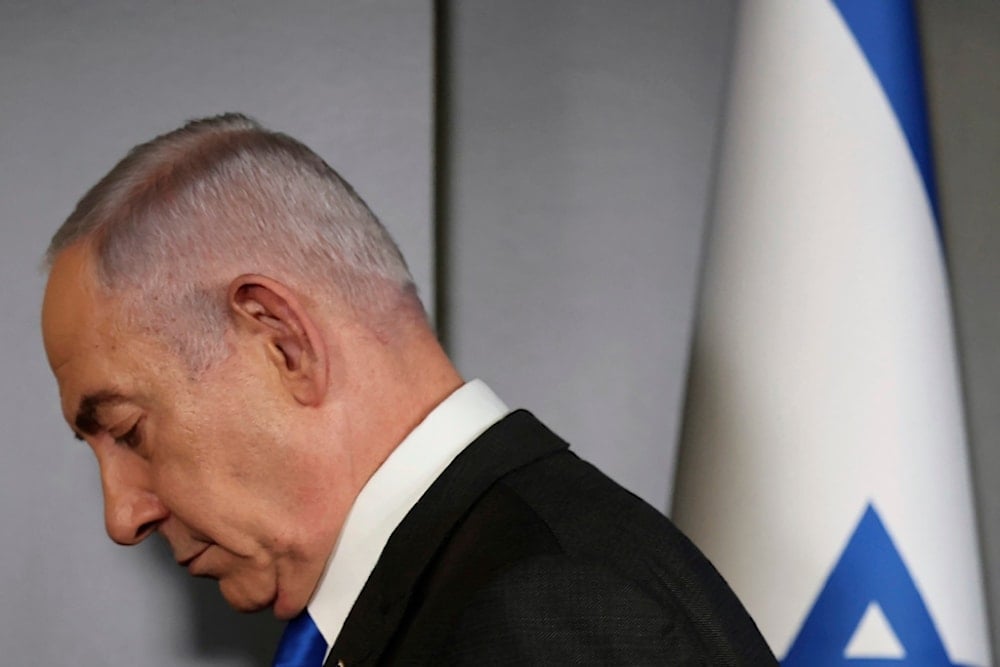Netanyahu set to face diplomatic hostility from UN members: Bloomberg
The piece draws on an extensive shift, comparing the state of "Israel's" diplomatic image a year ago to its current state, now tainted by the blood of indigenous Arabs.
-

Israeli Prime Minister Benjamin Netanyahu attends a press conference at the Government Press office in occupied Al-Quds, on September 4, 2024. (Abir Sultan/Pool via AP)
Bloomberg published an opinion piece on Thursday, detailing that the Israeli Prime Minister Benjamin Netanyahu is set to face strong diplomatic hostilities ahead of his upcoming visit to New York, where he will be attending the UN's annual General Assembly.
According to the report, Netanyahu is expected to defend his genocidal campaign in in Gaza, where over 41,000 were martyred since October 2023. He is also expected to defend the expansion of his military campaign to Lebanon, where he killed more than 600 people in the span of a few days.
"Israel" is now in the process of preparing for a ground invasion in Lebanon, despite allegations that the West is pressuring the Israeli occupation to resume talks on a ceasefire agreement.
The piece draws on an extensive shift, comparing the state of "Israel's" diplomatic image a year ago to its current state, now tainted by the blood of indigenous Arabs.
"At the UN’s annual General Assembly, he’ll come face-to-face with the reality that hostility toward his government — and him personally — is at a years-long high," the authors say. "Several world leaders have taken the podium to castigate Israel’s military campaign in the Gaza Strip, with at least one, Turkey’s President Recep Tayyip Erdogan, calling him out by name."
The normalization agreements were once touted as a milestone for peace in the region, but "Israel's" genocidal campaign in Gaza has roiled the region, making Netanyahu's optimistic vision from a year ago seem like a distant fantasy.
"When he speaks on Friday, he's certain to take a far different tone, defending his nation's campaign in Gaza, where the death toll has now reached more than 41,000," the writers said.
Read more: Hezbollah still able to hurt 'Israel', has not used 10% of power: Ynet
On Thursday, Netanyahu's office denied reports that he had ordered a reduction in military strikes on Lebanon to support truce negotiations. Instead, he instructed his generals to continue the aggression with full force.
Members of Netanyahu’s extremist coalition have opposed a truce, arguing that it would give Hezbollah an opportunity to regroup.
"Netanyahu believes that when he addresses the chamber, he’s addressing the world — and that audience includes Israelis back home, his base among them," Dan Gillerman, a former ambassador to the UN, said. "He will doubtless defend the war on Hamas — and now, Hezbollah — as necessary."
"Israel" claims its actions are guided by a purported right to "self-defense" after the October 7 operation. But the scale of "Israel’s" aggression on Gaza has led to increased international condemnation, leaving Netanyahu more isolated than ever at the UN.
"I sincerely think that the countries that support Prime Minister Netanyahu’s rhetoric need to make a bigger effort so that this genocide stops," Brazilian President Luiz Inacio Lula da Silva told reporters on the sidelines of the General Assembly.
"Israel" remained a central focus just before Netanyahu's arrival at the UN. On Wednesday night, the UN Security Council held an emergency meeting to address the Lebanon crisis, with a session on Gaza planned for Friday.
During the Lebanon discussion, France proposed a 21-day ceasefire to prevent a full-scale war in Lebanon. The proposal also aims to restart stalled cease-fire talks in Gaza and secure the release of captives held by Hamas, according to sources familiar with the matter.
Targeting Iran
Netanyahu is also expected to strongly criticize Iran, an ally of Resistance groups in Palestine and Lebanon, as he has done in the past, including during a fiery speech to the US Congress in July.
He has often used his UN appearances to warn of war, notably in 2012, when he illustrated Iran's "nuclear threat" with a cartoon bomb. In 2015, frustrated by a nuclear deal with Iran, Netanyahu expressed his disapproval with a prolonged, silent glare at the UN audience.
US Ambassador Linda Thomas-Greenfield said earlier this month that there is an "unfair amount of focus on Israel in the UN, and it is problematic."
Observers believe that despite the controversy, Netanyahu remains unwilling to avoid the UN, as doing so could inadvertently aid the campaign to isolate and exclude "Israel."
"It is in Israel's interest to show we are still acting, we are still meeting, we are still participating," said Robbie Sabel, an international law professor at the Hebrew University of occupied al-Quds.
Read more: 'Israel' committs massacres across Lebanon on fourth day of aggression

 5 Min Read
5 Min Read








